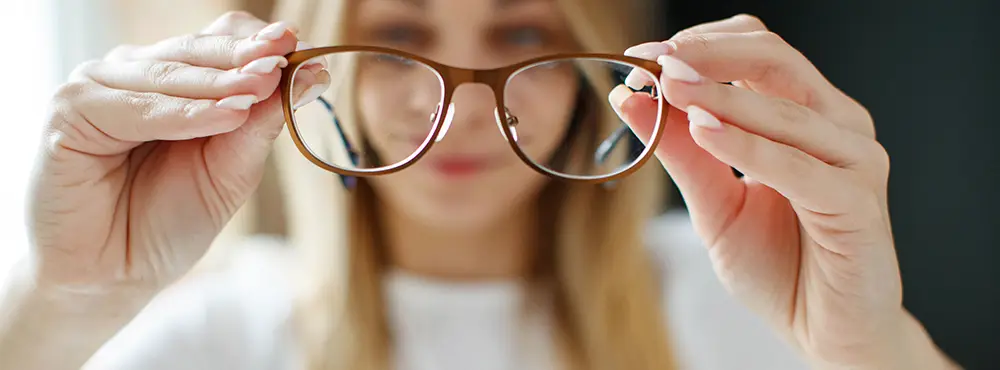What is myopia?
Myopia, more commonly known as short sightedness or near sightedness, begins quite early on for most people. It happens when the eyeball grows too long, causing objects to appear blurry in the distance. As one gets older, myopia becomes a growing problem to do with the eyeball. It gets worse as the eyeball keeps growing.

Myopia can have a detrimental effect on children's everyday life, hindering their ability to focus in a classroom or participate in sports. It can sometimes cause eye health problems in the future if it progresses.

This eye condition can be hereditary, but it’s also influenced by lifestyle factors. Sometimes it can be caused by both these factors.
Main risk factors for the development of myopia
Based on studies/research conducted, the main risk factors for the development of myopia include:
1. Parental myopia
Many studies have shown that a significant risk factor for the onset of myopia in children is parental myopia. A child is 6 times more likely to develop myopia if both parents are myopic.
2. Refractive error
Research has shown that if a child has a refractive error of +0.75D or less by the time they are 6-7 years old, they are more likely to become myopic by the time they reach their teens.
3. Age
The younger the child becomes myopic, the more likely they will develop high levels of myopia. This has been noted to be especially true if myopia onsets before the age of 10.
4. The amount and type of near work
Studies have suggested that more than 3 hours of near work time a day can increase the risk of myopia. Other studies have linked myopia to near work on digital devices in particular.
5. The amount of outdoor time
Those who spend less than 90-120 minutes a day outdoors are 2-3 times more likely to develop myopia according to a comparative study entitled ‘Myopia, lifestyle, and schooling in students of Chinese ethnicity in Singapore and Sydney.’
6. Ethnicity
Myopia and rates of its progression has been noted to be more prevalent in East Asian children compared to European children.
7. Gender
A nationwide study found that the progression of myopia tends to be higher in girls than in boys.

How can I prevent myopia from getting worse?
The following things can help to manage the progression of myopia:
Turn off digital devices
Spending lots of time on digital devices can lead to the progression of near sightedness. Today, children spend an increased amount of time in front of digital screens, be it performing work activities or playing games. While it's not realistic to ban these tools from children, limiting the amount of time they spend on them can control myopia progression and reduce many other side effects including computer vision syndrome symptoms, of which include:
Encourage outdoor play
Increased outdoor activity is a great way to get children off digital/electronic devices. Not only are children more likely to engage in distance vision activities while spending time outdoors, but research also suggests that children who spend lots of time indoors, in dim light are more likely to be myopic. In addition to this, outdoor sunlight will activate vitamin D, which is crucial for eye health.
Multifocal contact lenses
It's a good idea to speak to your eye care practitioner regarding myopia. Children can wear glasses and contact lenses to help them see better if they are short sighted. Nevertheless, this won't necessarily slow down the progression of myopia, and they may need a stronger prescription as they get older. The American Optometric Association suggests that multifocal contact lenses or progressive lenses can slow down myopia in children. These types of contact lenses can also provide effective treatment of this refractive error.
Atropine eye drops
Some opticians (mainly in the US and other countries) may also suggest atropine eye drops to slow down the progression of myopia. The high strengths of these eye drops can cause side effects, including stinging on instillation, light sensitivity and trouble reading. Low-strength drops are only available commercially in the United States.
Laser treatment has become a popular method of correcting myopia, but it will not slow down its progression. Laser eye surgery also carries potential risks such as dry eye, reduced night vision, seeing haze around bright lights and the removal of too much corneal tissue, leaving you with long sightedness instead. An assessment for laser suitability will need to be carried out and it’s best to check with your eye care professional/optician to see whether this is a suitable option for you. It is not recommended for anyone under the age of 21.
Orthokeratology
Orthokeratology or Ortho-K, also known as corneal refractive therapy, is a procedure whereby one is required to wear gas permeable contact lenses (RGP lenses) overnight as they gently and gradually reshape the curvature of your eye whilst you’re asleep. Lenses are removed in the morning when you wake up, resulting in clear vision (no contact lenses or glasses are required throughout the day.) Orthokeratology is non-invasive, safe and effective and therefore a good alternative to laser eye surgery. Ortho-k is used to correct moderate myopia up to -5.00 dioptres and -2.00 dioptres of astigmatism.
These types of contact lenses include brands such as Paragon Vision Sciences and Bausch & Lomb's Vision Shaping Treatment.
Can eye exercises cure myopia?
Eye exercises will not cure myopia as it is impossible for them to alter the shape of your corneas. Nevertheless, they can help to ease the symptoms of eye strain and can boost your overall eye health.
What foods reduce myopia?
As with eye exercises, certain foods will not reduce myopia. However, they can benefit your overall eye health. Whole foods and anti-inflammatory diets are essential to providing your eyes with the vitamins they need. A diet low in nutrient-dense foods can contribute to eye problems such as age-related macular degeneration.
Limiting the following foods can help towards improved eye health:
- Processed meats
- Foods with added sugars
- Ultra-processed foods
- Excessive coffee and alcohol consumption
- Refined vegetable oils
- Processed grains (like white bread, rice and pasta)
Overconsumption of these foods can not only create adverse health conditions, but they can also impact your eye health.
You should fill your diet with plenty of fresh fruits, vegetables, nuts and seeds, remember a well-balanced diet is key. Take a look at our blog on 'Foods to eat for good eye health’ or follow our 'Easy recipes for eye health' for more ideas.
We may not be able to stop myopia, however regular eye exams (at least every 2 years or sooner if you experience any issues) and taking care to implement the tips above will ensure that you're doing everything you can to keep your eye healthy.
Quick links:
A guide to myopia
How do multifocal contact lenses work?
Computer eye strain: Symptoms and solutions
Disclaimer: The advice in this article is for informational purposes only and does not replace medical care or an in-person check-up. Please check with an eyecare professional before purchasing any products or remedies. For information on our article review process, please refer to our Editorial Policy.

 Offers
Offers Account
Account
 Favorite
Favorite
 Basket
Basket

 OFFERS
OFFERS



















